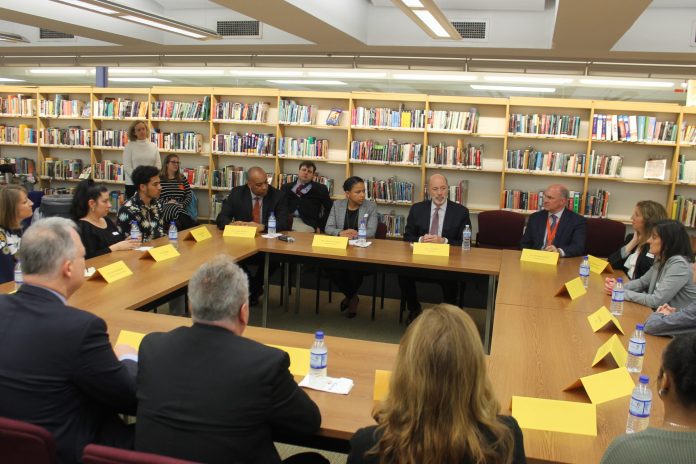Almost one year ago, Gov. Tom Wolf stopped by Pennsbury High School to speak with students, parents and faculty about the student loan debt crisis. He spoke about his proposed Nellie Bly Scholarship Program, which would help 44,000 students earn a college degree while graduating with less debt. One year later, the governor continues to stand by the program.
Recently, he held a press conference to discuss how the Nellie Bly Scholarship Program would provide need-based financial assistance for students at 14 universities in the state’s system.
“Our country has a student loan debt crisis and it’s a burden that lasts for years and holds young people back from starting a family, buying a home and saving for retirement,” said Wolf. “I am proposing the Nellie Bly Scholarship Program to help college students build lives in their communities rather than struggling to pay student loan bills every month.”
The Nellie Bly Scholarship Program provides a scholarship to full-time undergraduate students at the 14 Pennsylvania State System of Higher Education universities who have a household income of under $104,800. For the most economically disadvantaged students, the scholarship covers the tuition and fees gap not covered by a student’s Pell and PA State Grants. In exchange, the students agree to stay in Pennsylvania after graduation for the same number of years for which they receive the benefit or the scholarship becomes a low-interest loan.
The program also creates an Emergency Grant Fund at PASSHE to meet any emergency expenses the scholarship recipients might have, including books, paying final account balances, or other nominal costs that often prohibit students from registering for classes or obtaining transcripts.
The rising costs of higher education can prevent some students from starting college or graduating. Since 2010, tuition and fees at public higher education institutions have increased by 16 percent.
“The cost of attending college in Pennsylvania continues to prevent students and families from choosing to pursue a postsecondary education,” said Acting Secretary of Education Noe Ortega. “For many of our residents, loans have become the primary pathway to a college degree, and students must be willing to accept the burden of debt in order to pursue their dreams. For this reason, I stand with Gov. Wolf in support of the Nellie Bly Scholarship Program, which will open doors and create opportunities for students, as well as positively impact our state’s workforce and economy.”
The scholarship is named in honor of Nellie Bly, an Armstrong County native born in 1864. Bly attended the Indiana Normal School, now Indiana University of Pennsylvania, but left due to the cost. Bly became a pioneering journalist who helped to force reforms to the mental healthcare system in the early 20th century. Inspired by Jules Verne’s novel, Bly also completed a trip around the world in just 72 days.
Nearly a century later, higher education remains too expensive for many low-income and middle class families. The student loan debt for Pennsylvania residents is $68 billion, among the highest in the nation, averaging more than $39,000 per student. Approximately 70 percent of Pennsylvania students have student loans to afford college.
The scholarships benefiting 44,000 students would be funded by repurposing $199 million in slot machine revenue that is directed to the Pennsylvania Race Horse Development Trust Fund. Approximately 80 percent of the revenue goes to purses for horse owners, many of whom are from other states or countries.
The Pennsylvania State System of Higher Education is the largest provider of higher education in the commonwealth with 93,000 students. The university system includes Bloomsburg, California, Cheyney, Clarion, East Stroudsburg, Edinboro, Indiana, Kutztown, Lock Haven, Mansfield, Millersville, Shippensburg, Slippery Rock and West Chester.


